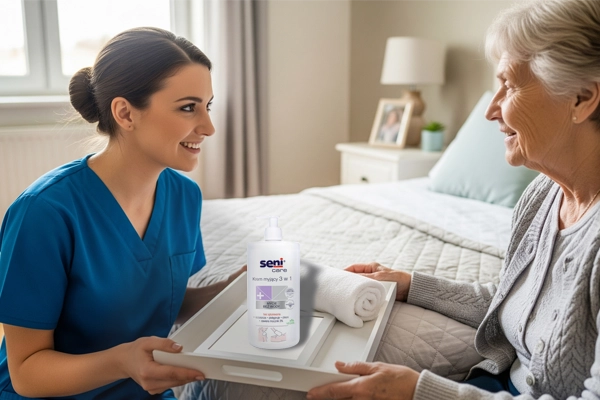Unpleasant skin odour – causes and solutions
 17 September 2025
/
17 September 2025
/
 6 minutes
of reading
6 minutes
of reading

Everyone's skin has its own individual scent, which changes with age due to many different factors. This is a normal process which does not require medical intervention, as long as the body odour is mild and pleasant. The problem arises when the odour becomes unpleasant. It is observed in patients who remain in bed for long periods of time or in elderly people, such as those suffering from urinary incontinence. Learn how to prevent and combat the unpleasant skin odour.
Skin odour results from the function of sebaceous glands, whose main purpose is to produce sweat. At first, this secretion is odourless. Its unique smell is caused by bacteria which live all over the human body and metabolise sweat. The result of this process is the characteristic odour of the skin.
What are the causes of unpleasant skin odour?
Depending on the amount of secretions and bacteria, the body odour may change. Babies have very few sweat glands, which is why their skin smells pleasant and sweet. In contrast, adults may sweat more heavily, which makes their skin odour more intense.
However, in elderly people the skin odour is milder, because the skin becomes thinner with age and the sebaceous glands are less active. So why is the unpleasant body odour so common in elderly people? This problem can have many different causes. Unpleasant skin odour can result from:
- diseases accompanied by excessive sweating, such as diabetes, thyroid disorders, cancer and kidney or liver failure,
- urinary and/or faecal incontinence,
- taking certain medications,
- experiencing a lot of stress,
- following an unbalanced diet rich in hot spices and vegetables with high sulphur content,
- not drinking enough water,
- neglecting body hygiene.
Another factor is using stimulants, such as alcohol or tobacco. They also affect the odour of a person's skin.
How can you prevent unpleasant odour?
If you want to prevent your patient’s skin from having an unpleasant odour, take care of their health first. Make sure they undergo necessary diagnostic tests on a regular basis so that any abnormalities can be detected and addressed as quickly as possible.
Skin odour is affected by daily habits, such as:
- daily physical activity – many people refrain from exercising to avoid sweating. However, regular physical activity is necessary for the proper functioning of the body, including the functioning of the sebaceous glands. With the right amount of exercise, blood will circulate faster and remove toxins more effectively, which can help reduce the intensity of skin odour,
- diet – skin odour often accompanies digestive problems. In order to avoid them, make sure your patient follows a healthy diet, i.e. chooses unprocessed products, limits meat consumption and eats an abundance of fresh vegetables and legumes. This will not only make them feel better but also improve their skin odour!
- personal hygiene – taking a shower or cleansing the body in the case of bedridden patients every day and changing clothes, especially underwear, on a regular basis is an essential part of preventing the buildup of sweat and the proliferation of bacteria responsible for unpleasant skin odour,
- changing bed sheets – human skin secretes sweat all the time, also at night, so make sure to change your patient’s bed sheets regularly. This is especially important in patients who remain in bed for long periods of time,
- using a thin comforter and a blanket instead of one thick comforter – this will allow the body to regulate temperature more easily,
- doing laundry – bacteria and other pathogens die at temperatures above 55°C. If you want to prevent them from proliferating, wash your patient's bedsheets and clothes, including underwear, at temperatures above 60°C or add special disinfectants to your laundry detergent.
In order to ensure that the room smells pleasant as well, regularly ventilate the room where you spend the most time.
How can you combat unpleasant odours?
Sometimes, despite your best efforts, an unpleasant odour cannot be prevented. If unpleasant odours linger in a room, use an odour neutraliser.
This product contains a natural ingredient rich in enzymes. It helps break down odour molecules and eliminate unpleasant smells from the room, e.g. when urine or faecal odours linger after changing an absorbent product. It fills the room with a pleasant aroma which does not irritate the nose and improves the patient’s mood.
Many people confuse an odour neutraliser with a classic air freshener. However, they are two completely different products. Neutraliser does not mask the odour but accelerates the breakdown of its molecules. Therefore, it effectively eliminates unpleasant odours and leaves the room smelling fresh for longer.
Remember that if the source of the odour is not removed, e.g. the bin with used personal hygiene products is full and remains open, you will have to use the neutraliser several times. However, as soon as you dispose of the waste and use the neutraliser, the problem will disappear.
It is also a good idea to use products which contain a special odour-neutralising ingredient every day. You can find it in our skin cleansing products for use without water, such as Seni Care wash cream 3-in-1 or Seni Care conditioning and washing body foam. This ingredient will help prevent unpleasant odours as you cleanse your patient’s skin. It will also leave the room smelling fresh and improve your patient's wellbeing.
If your patient uses absorbent products, we recommend you complement their daily skincare routine with products such as Seni Care body care cream with arginine or Seni Care body care cream with zinc oxide. In addition to ingredients that reduce the risk of chafes, they also contain an odour neutraliser.
A pleasant smell in the room, as well as refreshed and fragrant skin will bring greater comfort and improve the mood not only of the patient but also of their carer. Performing daily tasks will become easier and much more enjoyable. See for yourself!





 Homepage
Homepage
